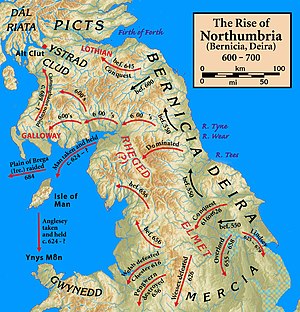Bernicia (Old English: Bernice) was a kingdom in Northern England. It was an Anglo-Saxon kingdom established by Anglian settlers in the 6th century. Bernicia occupied about the same area as the modern English counties of Northumberland and Durham, and the former Scottish counties of Berwickshire and East Lothian. Bernicia was one of two Anglo-Saxon kingdoms located north of the River Humber. The other was Deira and in the early 7th century they combined to become the kingdom of Northumbria.

Roman and British Bernicia
changeThe name Bernicia was an Anglicization of the earlier Celtic name Bryneich (or Beornice).[1] The name probably meant 'The Land of Hills' or something very similar.[2] It was the territory of the Guairi, a clan of the Votadini tribe.[a][1] Their fortress home was the pre-Roman Din Guairi (fort of the Guairi).[b] A large part of the Votadini under the leadership of Cunedda removed to north Wales creating the dynasty of Gwynedd.[5] The remaining Votadini were not strong enough to withstand attacks by the Picts. After 410[c] they called in Germanic mercenaries[d][5]
English Bernicia
changeThe details of the arrival of the Germanic Angles in this area is not to be found in historical sources,[7] According to Bede the founder of the Bernician dynasty was Ida of Bernicia. But he had little detail on the Bernician kings before the reign of Athelfrith of Bernicia (died 616).[7] Bede dated Ida's reign to starting in 547.[8] He also gives the impression that the next four kings had all they could do to hold onto their territory. They had constant battles with the British during this time.[8] Athelfrith was the first to expand the territory at the expense of the British. In 605 Athelfrith united the two kingdoms, Bernicia and Deira, into a single and powerful kingdom called Northumbria.[9]
Kings of Bernicia
change- Ida (547–559)
- Glappa son of Ida (559–560)
- Adda son of Ida (560–568)
- Aethelric son of Ida (568–572)
- Theodric son of Ida (572–579)
- Frithuwald (579–585)
- Hussa (585–593)
- Athelfrith (593–616) ruled Bernicia 593–604, Northumbria 605–616. Combined Bernicia with Deira to form Northumbria.
Kingdom briefly split
- Eanfrith of Bernicia son of Æthelfrith (633–634)
- Oswald son of Æthelfrith, Bernicia reunited with Deira under Northumbria from 634.
Notes
change- ↑ The Votadini were a Celtic people. Their territory was in what is now south-east Scotland and north-east England.[3]
- ↑ The Angles called it Bamburgh, named after the Pictish wife of Athelfrith of Bernicia, Bebbe.[4]
- ↑ The last Roman legions left Britain in 410 AD.[6]
- ↑ No doubt these were Angles and Saxons.
References
change- ↑ 1.0 1.1 Mike Ashley, The Mammoth Book of British Kings and Queens (New york: Carroll & Graf, 1999), p. 753
- ↑ Ireland: Revolution and Evolution, ed. John Strachan, Alison O'Malley-Younger (New York: Peter Lang Publishing, 2010), p. 68
- ↑ Carl Waldman; Catherine Mason, Encyclopedia of European Peoples (New York: Facts On File, 2006), p. 851
- ↑ Bede, Ecclesiastical History of the English People, trans. Leo Sherley Price, revsd. R. E. Latham (London; New York: Penguin, 1990), p. 168
- ↑ 5.0 5.1 John Marsden, Northanhymbre Saga; the History of the Anglo-Saxon Kings of Northumbria (London: Kyle Cathie Limited, 1992), p. 17
- ↑ Michael E. Jones, The End of Roman Britain (Ithaca, NY: Cornell University Press, 1996), p. 110
- ↑ 7.0 7.1 N. J. Higham, The Kingdom of Northumbria AD 350–1100 (Dover, NH: Alan Sutton Publishing, 1993), p. 76
- ↑ 8.0 8.1 Frank Stenton, Anglo-Saxon England (Oxford: Oxford University Press, 1971), p. 76
- ↑ C. W. Previté-Orton, Outlines of Medieval History (Cambridge: Cambridge University Press, 2013), p. 95